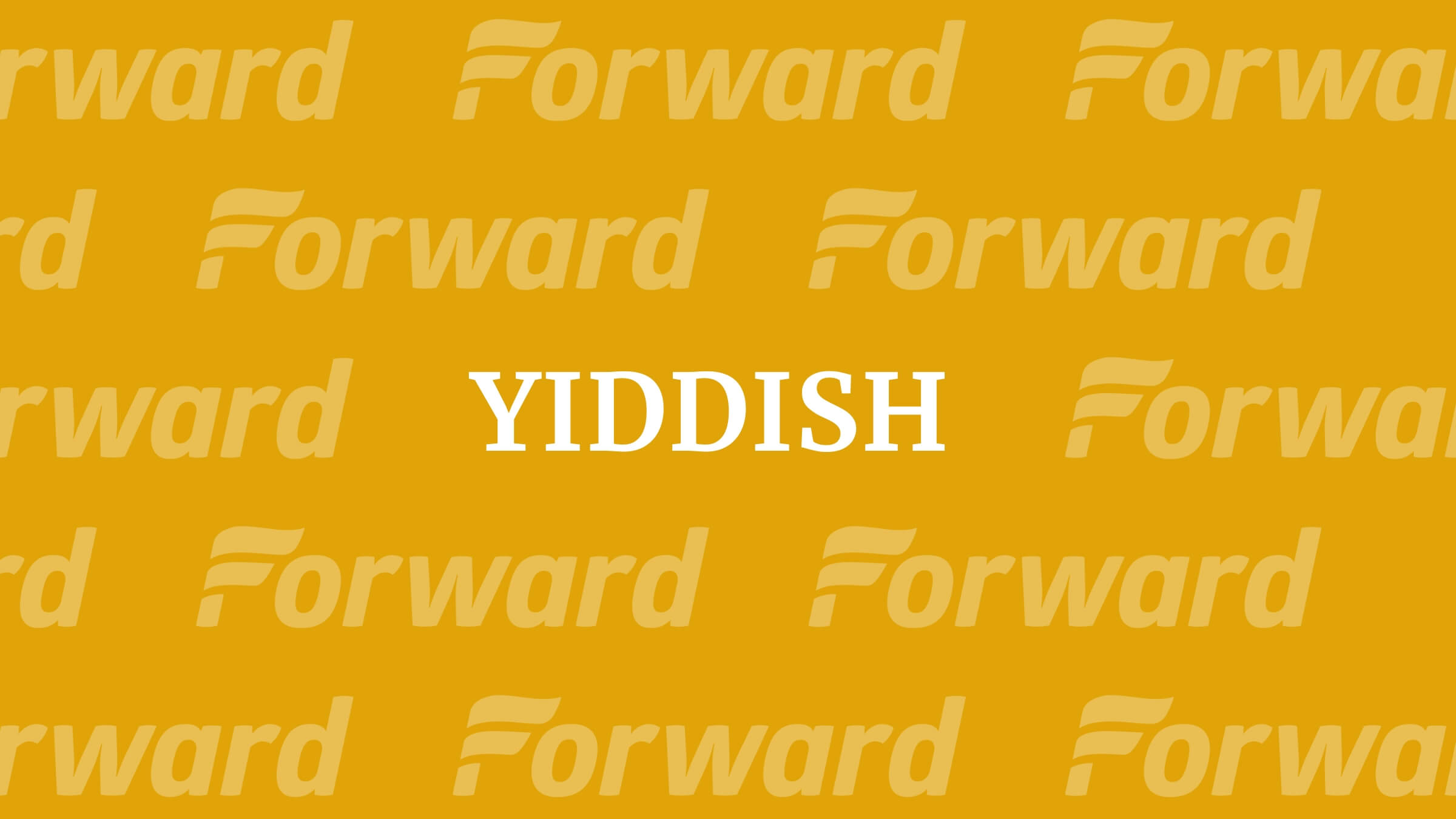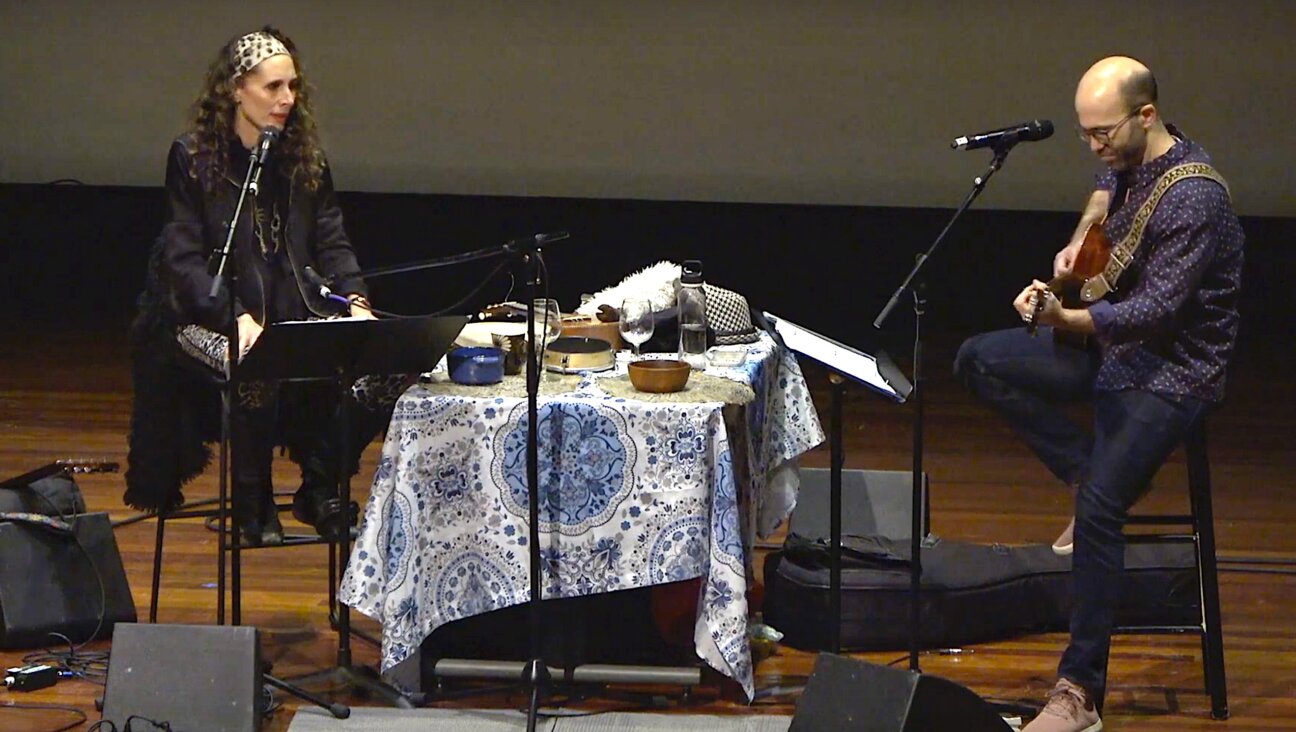Why More Yiddish Radio Broadcasts Would Help Israel

Graphic by Angelie Zaslavsky
This article originally appeared in the Yiddish Forverts.
The decision by the Israel Broadcasting Authority, as part of its transformation into a new agency—the Israel Broadcasting Corporation— to drastically reduce its daily Yiddish radio programming to a weekly half-hour broadcast greatly disappointed Yiddish listeners around the world.
None of us, however, were surprised. The writing had long been on the wall. Together with laying off journalists and radio and television hosts, the new agency, branded as “Kan” (“Here” in Hebrew), would continue to reduce programming for new immigrants and Jewish communities abroad. The already meager amount of radio time allotted to broadcasts in diasporic Jewish languages proved to be an easy target for bureaucrats looking to make further budget cuts. (Besides Yiddish, the IBA had regular programming in Ladino, Bukhori, Judeo-Moroccan Arabic and Judeo-Aramaic. Broadcast time was also drastically reduced in Ladino, and Judeo-Aramaic broadcasts have ceased altogether).
Even so, it was a major blow. As the last daily Yiddish-language radio program in the world, the IBA’s broadcasts were an important symbol for a language many commentators have long left for dead. For Yiddish speakers, the radio show served as an important source of information on Israeli news and politics as well as Yiddish cultural events in Tel Aviv and Jerusalem. The daily broadcasts also provided an opportunity for Yiddish listeners to get in touch with their roots through replays of interviews with Yiddish writers and, especially, the wonderful musical performances recorded at the IBA’s studios in the 1950s through 1980s.
It’s almost besides the point to explain why reinstating the daily Yiddish broadcast would benefit Yiddish listeners. In any case, such an explanation would be unlikely to move anyone in a position of power in Israel. As the great Israeli Yiddish newspapermen Mordechai Tsanin z’’l and Itzhak Luden have extensively documented, the Jewish State systematically suppressed Yiddish for more than four decades. Among many injustices, the Israeli government prevented the production of Yiddish television shows, effectively banned local actors from performing in Yiddish theater, and even prohibited state officials from speaking to new immigrants in the language. Government workers were instead instructed to speak only in Hebrew, and if that failed, in any other language they knew. This meant that two native Yiddish speakers would be forced to communicate in Polish, Russian, or another non-Jewish language while linguistically assimilated European Jews could be served in their mother tongues.
The impact of this campaign is still being felt today. Nearly every important Israeli governmental website can be accessed in English, Russian, French, Amharic and other foreign languages but never in Yiddish. The same is true in many other spheres of Israeli life: information packets and forms for new immigrants are not (and with few exceptions have never been) available in Yiddish. Recorded tours of all major governmental buildings and museums are available in a dozen languages but never Yiddish. Even Yad Vashem, the nation’s Holocaust museum, does not offer recorded tours in the native language of 75% of the genocide’s victims.
In the 1940s -1970s, Yiddish, along with the cultural identity of its speakers, was considered to be a genuine threat to the creation of a new Israeli identity. The situation has since evolved. Nobody in 2017 believes that Yiddish still threatens Israeli society. In truth it never did. At best, Israeli officials today believe Yiddish to be irrelevant. At worst, it has been simply forgotten.
I recall this painful history not to condemn Israel or to claim that Yiddish deserves more radio time because it was historically repressed by the Jewish State. Rather, I’d like to put forth a purely utilitarian argument as to why Israel would be well served if the Israel Broadcasting Corporation were to increase its Yiddish offerings.
First, one must consider which communities speak the language today and why they will continue to grow in importance. Yiddish-speaking Jews include:
Israeli Haredim:
One of the strongest perpetual criticisms of the Israel Broadcasting Authority was that it did not provide enough programming that met the cultural needs of the Haredi sector. It may sound paradoxical considering that Haredi Jews are usually discouraged by their communities from watching TV or listening to the radio, but many of Israel’s most religiously stringent Jews are in fact covertly accessing news online. I know this first-hand from seeing how many people in Bnei Barak regularly read the Forverts.
Israeli Haredi communities include many people who are eagerly looking for news and cultural programming that is timely, relevant, and appropriate for their community. Although the official political line of most Yiddish-speaking Hasidic sects is strictly anti-Zionist, many young people today are questioning the political positions of their rabbis. Culturally appropriate Yiddish-language radio broadcasts aimed at the Haredi sector would be a good way to help integrate religious youth into wider Israeli society.
Hasidic Jews abroad:
The Israeli government relies on the support of American Jews, but the American Jewish community is rapidly changing. It’s estimated that more than 60% of American Jewish day school students are Haredi and a plurality of them – Yiddish-speaking. If Israel wants to maintain a close relationship with American Jewry, it will need to reach out to this growing population. During the Obama administration, Hasidic lobbying groups gained unprecedented political access previously reserved for decades-old mainstream Jewish communal organizations. Changing demographics will ensure that the bulk of Jewish political power in America will rest in the hands of Yiddish-speaking Hasidim in two generations.
As in Israel, many young Hasidic Jews are questioning the anti-Zionist views of their rabbis and eagerly looking for media programming that is appropriate for their cultural needs. An online Yiddish-language radio or television show aimed at the international Hasidic diaspora (which includes sizable communities in the USA, England, Canada, Australia, Belgium, and Switzerland) would give Israel an opportunity to establish a relationship with this critical Jewish community and reach out to its younger members, who in fifty years will be the grandparents of the largest segment of American Jewry.
Children of Holocaust survivors:
It’s no surprise that among Israel’s greatest supporters abroad are many whose parents survived the hellfire of Nazi-occupied Europe. In dozens of countries, across five continents, Yiddish-speaking children of Holocaust survivors are searching for connections to both the Jewish culture of their parents and the Jewish State. A Yiddish-language radio or television show tailored to this audience would reach a diverse segment of Jews who are unusually active in Jewish communal life and influence the identity of their children and grandchildren.
Young Yiddishists and Yiddish Scholars:
True, this is a much smaller group of people but a very important one all the same. Yiddishists, especially those raising their children as Yiddish-speakers outside of the Hasidic world, are among the most committed Jews whose identity does not revolve solely around religion, Zionism, or the Holocaust. Their Yiddish-cultural identity, which Israel so strongly spurned, can serve as a model for the future survival of Jewish life in the diaspora outside of the Orthodox world. And that’s precisely why it’s so important for Israel to reach out to young Yiddishists instead of continuing to ignore them.
Many young American Yiddishists oppose the Israeli government’s policies and are (rightfully) bitter about the suppression of Yiddish in Israel. An Israeli TV show in Yiddish for foreign viewers would be a good way to establish a rapport with these young people without mentioning politics, overwrought “hasbara,” [public diplomacy] or other aspects of Israeli society that alienate so many young American Jews.
There is also a growing interest in Yiddish among Israeli academics. When I attended the quadrennial World Congress of Jewish Studies at Hebrew University in Jerusalem, the conference’s sole Yiddish-language panel was placed in a small classroom. The organizers simply didn’t believe that a sizable audience would come out to hear academic lectures in Yiddish. Despite their doubts, the room was so packed that many were left to listen from the hallway.
The same would likely be true of properly funded Yiddish radio and television broadcasting in Israel. New programming, well-publicized and marketed, would attract a far larger audience than is commonly believed.
The Israeli government may have forgotten about Yiddish, but the language is far from irrelevant.
























